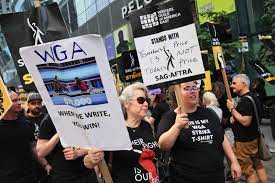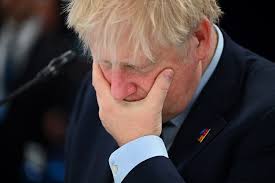The most recent encounter between Hollywood’s striking screenwriters and high-ranking executives from Disney, Universal, Warner Bros., and Netflix concluded without a resolution, as stated by the writers’ union.
After an interval of over three months without communication from the studios since the strike commenced in May, discussions with the Writers Guild of America were reignited earlier this month.
However, negotiations remain at a standstill subsequent to a proposal presented by the studios. The proposal aimed to increase wages, enhance working conditions, and partially limit the utilization of artificial intelligence. Unfortunately, this proposition was met with rejection during the recent meeting held on Tuesday.
The Writers Guild of America negotiating committee expressed their perspective on the talks, stating, “Instead of a constructive dialogue aimed at reaching an agreement, we were subjected to a discourse extolling the virtues of their singular counteroffer.”
Regrettably, the committee concluded, “The intention behind this gathering was not to facilitate an accord. Rather, it appeared to be an attempt to pressure us into yielding.”
The ongoing writers’ strike, which has been joined by an actors’ strike since mid-July, has effectively halted a significant portion of the film and television industry. This work stoppage is resulting in daily losses amounting to millions of dollars for Hollywood.
Even with the notable presence of prominent CEOs, such as Bob Iger from Disney, Ted Sarandos from Netflix, Donna Langley, the chairperson of Universal, and David Zaslav from Warner Bros., at Tuesday’s meeting, no resolution could be reached.
“We have presented an offer that addresses the primary concerns expressed by the writers,” stated Carol Lombardini, the President of the Alliance of Motion Picture and Television Producers.
Lombardini emphasized that the studios and streaming platforms had put forth a reasonable proposal, which includes a 13 percent wage increase for writers over a span of three years.
They furthermore committed to disclosing to the WGA the quantity of hours that shows are being streamed, a data set presently held as confidential.
Although studios have expressed a commitment to increased transparency regarding streaming audience metrics, they have not yet presented a definite proposal to amend residual payments.
The surge in streaming’s popularity has resulted in residuals for shows on these platforms falling behind those of traditional television, a pivotal issue causing friction in ongoing negotiations.
The AI proposal involved granting writers the opportunity to revise scripts initially generated by AI. They would receive exclusive credit as the primary authors, entitling them to appropriate compensation.
However, the concept of training AI using pre-existing scripts has raised concerns for the Writers Guild of America (WGA), marking a clear boundary.
The WGA responded by asserting that the studios’ proposition was marred by “constraints, gaps, and oversights” which neglected to adequately shield writers from the very threats that prompted the initial strike.
In a resolute statement, the writers declared, “We will meet you all on the picket lines, allowing the corporations to witness the might of collective labor power.”




